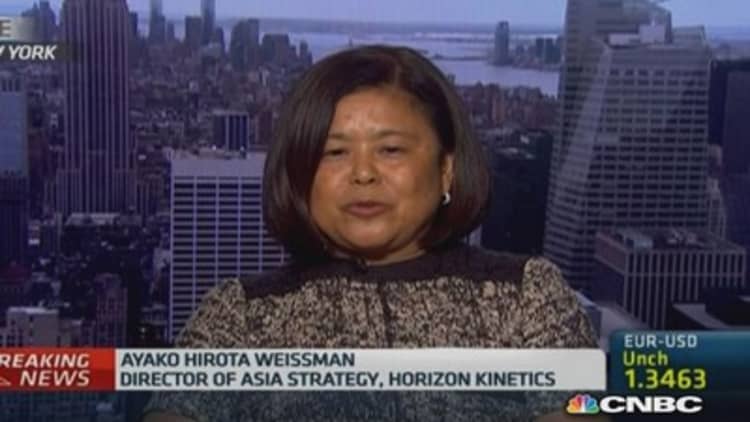Japan watchers are paying particular attention to this reporting season which they say will give important insights into how corporate profitability is holding up following the recent consumption tax hike.
"At the beginning of this fiscal year [April 2014], company guidance tended to be on the weak side because of concerns around consumption tax hike. But so far the macro environment hasn't been so bad, so earnings could be better than originally expected," Hiromichi Tamura, chief strategist at Nomura Securities told CNBC.
In April, Japan raised its consumption tax to 8 percent from 5 percent, the first increase in 17 years, as part of efforts to rein in mounting public debt. The move prompted concerns that the economy's fragile recovery could be derailed. However, its impact has so far been mixed, with corporate sentiment souring, but consumer demand holding up.
Read MoreJapan business sentiment takes a hit, rebound seen
Japanese car sales, for example, climbed 0.4 percent to 452,555 units in June – the first gain in three months. Business confidence, meanwhile, dipped in the second quarter – the first fall since Prime Minister Shinzo Abe came to power in late-2012 and unleashed radical measures to kickstart the economy.
Nomura expects growth in recurring profit – which is before tax and extraordinary items – of around 10 percent on year for the April-June quarter.
Japan's earnings season gets into full swing this week, with Nissan Motor reporting on Monday, Nomura, Shinsei Bank, Japan Airlines and Honda Motor on Tuesday, All Nippon Airways (ANA), Nintendo, steelmaker JFE, telco KDDI and Mitsubishi Motors on Wednesday and Sony, Toshiba, Fujitsu, Panasonic, Mitsubishi UFJ and Mizuho on Thursday.

Kenji Abe, equity strategist at Citi expects a mixed outturn from Japan Inc, with sectors reliant on domestic demand to see softer earnings, while manufactures and exporters to perform better.
What else to watch for
According to Jesper Koll, head of Japanese equity research at JPMorgan Securities, the key factor to watch is how demand out of China is holding up for Japanese corporates.
Despite geopolitical tensions between the two countries, China remains one of the most important destinations for Japanese products. The mainland accounts for around 18 percent of the country's total exports, according to Capital Economics.
Read MoreWhat happened to Japan's yen-driven export boom?
"People are going to be watchful for signs of orders from China, and whether orders continue to remain weak," Koll said.
The world's second largest economy appears to be picking up steam, going by the latest HSBC/Markit Flash China Manufacturing Purchasing Managers' Index, which rose to an 18-month high in July.
"Marco data out of China is showing bright signs, so companies that export to the China market may show earnings improvement," said Abe.
Another factor to watch for is whether earnings are merely being driven by a weaker yen, rather than a genuine improvement in business operations, say strategists.
Read MoreJapan inflation quickens on back of sales tax hike
The has lost 30 percent of its value against the U.S. dollar since the end of 2012, currently trading around the 101.80 level.
"Japanese corporate earnings have recovered mainly due to yen weakening. Now, investors are looking for additional factors, like an improvement in profit margins," said Tamura.


